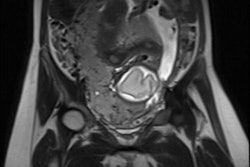Researchers from Virginia and Texas have received a grant for $2.7 million from the U.S. National Institutes of Health (NIH) to investigate potential complications of pregnancy by using ultrasound to study microvascularization of the placenta.
Researchers from Eastern Virginia Medical School (EVMS) and the University of Texas Medical Branch will collaborate with ultrasound vendor Toshiba Medical Systems America on the project, which will use the vendor's Aplio 500 Platinum scanner, with a team led by Dr. Alfred Abuhamad of EVMS.
The researchers plan to use the Toshiba scanner and its Superb Micro-Vascular Imaging (SMI) and shear-wave elastography techniques to predict which women might have poor pregnancy outcomes by analyzing microvascularization of the placenta, placental tissue elasticity, and placental calcification content. The goal is to ultimately develop an algorithm that can predict late pregnancy complications in early gestation.
The study is part of the Human Placenta Project, which is a research initiative by the Eunice Kennedy Shriver National Institute of Child Health and Human Development. NIH has awarded 19 grants, totaling approximately $46 million.



















